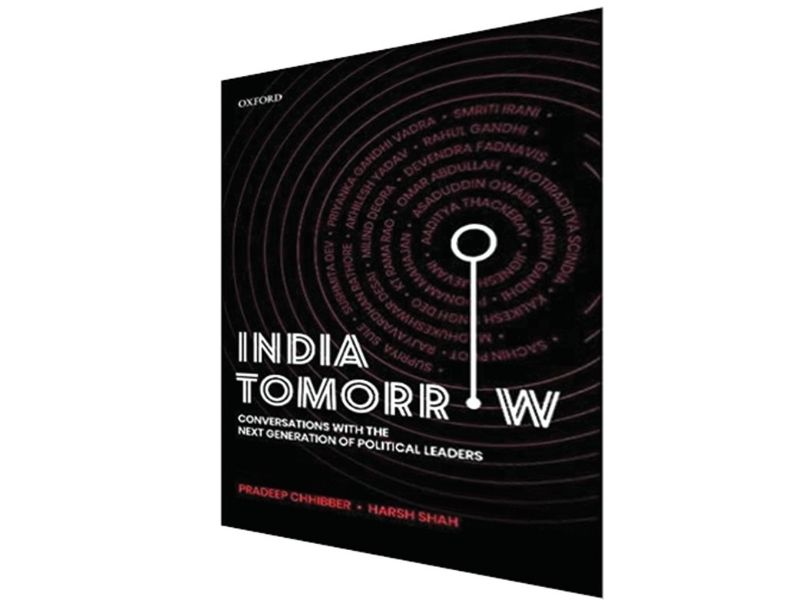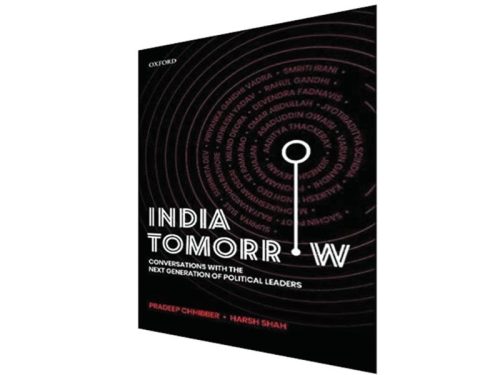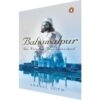Tomorrow’s leaders: India Tomorrow
Sarthak Bagchi (The Book Review)
 India Tomorrow: Conversations with the next generation of political leaders Pradeep Chhibber & Harsh Shah, Oxford University Press Rs.850 Pages 276
India Tomorrow: Conversations with the next generation of political leaders Pradeep Chhibber & Harsh Shah, Oxford University Press Rs.850 Pages 276
This book is a compilation of interviews with some of India’s prominent young politicians who are touted as the next generation of Indian politics. In interviewing these politicians, the authors begin with a simple stated goal — “to understand their personalities and ideologies and offer readers unique insights” — and have been quite successful in achieving this. Unfortunately they don’t reveal more about their personalities than what is already known in the public domain.
Rahul Gandhi’s passion against inequality, Aditya Thackeray’s concern for environment, Devendra Fadnavis’s penchant for numbers and data, Sachin Pilot’s modest demeanour, KTR’s fascination with technocracy are already well captured in their political profiles. Poonam Mahajan, Rajyavardhan Singh Rathore and Smriti Irani come across as mature politicians with well-rehearsed answers revealing little insight into their personalities.
The authors have chosen to keep their interviewees below 50 years of age, which is what essentially makes them tomorrow’s leaders of India. However, going through the list of names, it becomes clear that may be age (or lack of it in this case) is not the only asset which qualifies them as India’s political future — it is also their family legacy and political lineage. Only three out of the 20 featured in this book are first generation politicians: Jignesh Mevani, Rajyavardhan Singh Rathore and Smriti Irani.
The selection of elite politicians with strong political dynastic linkages (four politicians coming from families directly linked to a prime minister and five with a chief minister in their family) has been justified by the authors as acknowledging that contesting elections in contemporary India requires money and resources, which become more accessible for politicians with dynastic linkages in politics.
It is not entirely true though, that there’s a lack of non-elite politicians who can influence India’s political future. The age limit of below 50 might have kept Arvind Kejriwal of Aam Aadmi Party (Delhi) and Thol Tirumavalavam of Viduthalai Chiruthaigal Katchi Party (Chennai) outside the authors’ radar. However, the authors seem to have ignored many young politicians with the common touch like Atishi Marlena, Kanhaiya Kumar, Hardik Patel, Saurabh Kumar, Manoj Manzil, Hemanta Biswa Sharma, Tejasvi Surya, Mohua Mitra who have made a name for themselves, earning popularity and mass following in both the real world and in the world of social media, which has emerged as a new theatre of political performance in recent times.
Besides these young politicians who are mostly first generation and self-made individuals coming from student politics or other professional backgrounds, there are also some remarkable names with dynastic connections, which to my mind merit inclusion in any list which is seen as representative of India’s political future. Tejashwi Yadav and Chirag Paswan in Bihar, Hemant Soren in Jharkhand, Dushyant Chautala in Haryana, and Gaurav Gogoi in Assam are some of the leaders from regional political families with potential to influence the politics of their specific regions.
Tejashwi Yadav has been a deputy chief minister and is the leader of opposition in one of India’s most politically vibrant states, while Soren and Dushyant Chautala are the chief minister and deputy chief minister of their respective states.
The authors deserve much credit for the quality of interviews and interactions that they have managed to bring together for this compendium. Omar Abdullah’s lack of faith in the Indian state and his disappointment with the institutional and procedural injustice meted out to Jammu and Kashmir by reneging on their statehood, emerges clearly from the interview.
Similarly, Priyanka Gandhi’s answers reveal a lot about her lack of a normal childhood for both her and her brother, which have left a deep impact on their personalities.
It is also not surprising to see that many politicians in the Bharatiya Janata Party firmly believe that by being in the party, they have a chance or opportunity to rise through the ranks to reach the top position at some point in future. This optimism is second only to the ideological commitment of its members and it seems to cut across elite and non-elite backgrounds, with Poonam Mahajan, Madhukeshwar Desai and Smriti Irani all stressing this point. This is also important since one of the main problems of most political parties in India, especially the regional ones, is that they are tightly-controlled family enterprises, operating more like family firms than political parties. Many talented politicians with aspirations of political success do not find these parties attractive because they know they will never get to reach leadership positions which are reserved for first family members.
Reading these detailed and elaborate interviews enables one to set aside the popular images of some politicians, heavily influenced by their portrayal in the media. The cases of Rahul Gandhi, Varun Gandhi and Asaduddin Owaisi stand out in this respect. It is indeed interesting to see Rahul Gandhi’s clarity on many matters of economic and social policies. Similarly, the popular media portrayal of Varun Gandhi and Owaisi as fundamentalist leaders prone to use verbose rhetoric and divisive narratives is completely falsified when one reads Varun Gandhi’s economic ideas and concepts which he uses in his books as well as in public addresses in Indian universities, or when one reads about Owaisi’s commitment to constitutionalism, rule of law and citizenship rights.
Besides providing useful insights into the hearts, ideas and minds of some of India’s more famous young politicians, this book also provides pointers to new and interesting exploratory research in the field of party politics by looking at party organisation structures and leadership questions, as studies of Indian politics so far have gravitated towards quantitative analyses of electoral politics. This book brings the leadership question back into primacy as a much needed future theme of research in Indian politics.
Also read: Internet age politics: How to win an Indian election
















Add comment